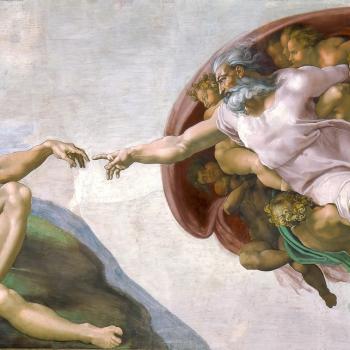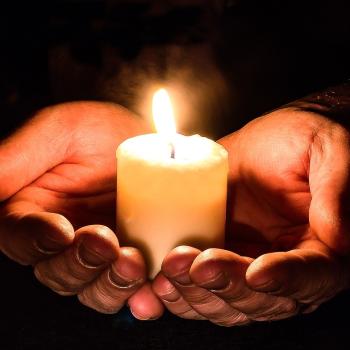The Given Versus the Chosen
We are born into a world where most of what we experience comes as pre-packaged components or “modules”. These include physical objects, living creatures, the physical systems they dwell in, and the physical and cultural laws and processes they operate by. Even the behavior of humans and other creatures are guided to a great degree by unconscious psychological modules comprised of instinct, habit, memory, enculturation, and social norms.
Returning to the motion picture analogy, people who adhere to the physicalist/ materialist ideology would maintain that the above are the totality of all that exists. The “stuff” of the world and “script” of the life-drama is fixed — pre-written by the statistical interaction of the simple forces that lie at the base of known existence. Such beliefs suggest that the appearance of conscious awareness and human agency is fundamentally an illusion.
However, if you have read this paper to this point, you may be amenable to the idea that the above is only part of the story — that the story-script of our lives may be open to some “editing”.
Continuing the above analogy, a prayer request or intention is like a film director asking for particular changes to the storyline, dialogue, costuming, set design, lighting, music and the like. The director him or herself does not need expertise in these areas but upon imagining a change, simply expresses an intention to those who do. The director’s intention arises from his or her creative imagination which “observes” an alternative option, whereupon it is actualized by the agents with the power to do so.
Similarly, prayer consists of holding a vision or intention for a hoped-for set of events — particularly a felt sense of “what it is like to be” the alternative reality — which then may then be realized by conscious agency at a deeper level — be it the individual subconscious, a collective unconscious, or forces more supernormal.
Stated concisely, prayer is imagination and directed attention, while collective imagination is exponentially amplified prayer.
Which Aspects of Reality Can Be Affected Through Prayer?
Just as a film director might make some requests that are easy to fulfill (e.g. dialog changes) or some that are not (demanding superhuman feats from an actor). some prayer intentions may be realized more readily than others. These might be ordered in three categories – from most likely to most difficult:
- Events that occur in the immaterial/ psychological / emotional realm
- Events in the physical world that vary by common means (especially when there is some ambiguity regarding cause and effect)
- Events that would apparently violate fundamental laws of physics
These are not hard and fast categories but are based on how much variability is observable under normal circumstances.
Following the theory proposed in this paper, the ease or difficulty of realizing a prayer intention correlates with the quantity of event-lines and bundled modules that comprise the experience (simple or more complex), as well as the level of consciousness at which they are observed (individual or collective).
Accordingly, mental/emotional events – thoughts, feelings, perceptions, beliefs, habits – are most malleable because they occur in a domain that we normally have a significant degree of control over. It is far easier for example, to change one’s own beliefs and perceptions than those of a larger social group (as any political action group can attest).
Beyond this, events in the physical world that involve human agency incorporate the above but are more difficult to alter since we do not have direct access to the subjective experience of others (i.e. to change other’s attitude, values, or intentions). Outside of direct communication, some transpersonal influence might be needed.
In the second category above are events in the physical world that might unfold in a variety of ways (i.e. “event-line paths” in the theory proposed here). For example: traveling by plane or automobile from one point to another, will I arrive safely or be involved in disaster? Attending a public event during times of pandemic, will I become infected or not?
In each such case, there are practical steps one might take (wear seatbelts, be vaccinated) to improve the statistical odds of a favorable outcome, yet there are additional factors beyond one’s direct control, such as the behavior of other drivers, or the general health of other crowd-members.
Even events in the physical world that are normally considered beyond human control —weather, fires, floods, earthquakes — result from a complex of factors and therefore may unfold in a variety of ways. The premise of this paper is that, in a consciousness-primary universe, the statistical probability of these, too, might be affected by which outcome individual or collective consciousness chooses to attend to. Roughly stated, focus upon what is desired rather than what is feared.
“On whatever you place your attention, that becomes your reality”
— William James
The third category listed above pertains to events that would be considered genuinely miraculous: raising the dead, healing withered limbs, altering past events.
If experienced reality is fundamentally based in Consciousness, in theory, anything might be possible. Yet the existence of all we know has been a progressive emergence over time, according to apparently consistent, stable laws of physics, set at a level of consciousness far above the individual or group. To an overwhelming degree, this is necessary for a stable, predictable, functional world. Accordingly, whether “1.0” or “2.0”, praying for an event that alters physical reality in fundamental ways would likely have lower statistical probability of being realized.
Yet, scientific theory is always a working hypothesis and so must remain open to new data.
In next week’s essay, we will consider the following questions:
If prayer requires more active involvement than simply articulating a list of requests, then passively turning it over to a higher power to do the work, what might it require of us? How might we engage?













